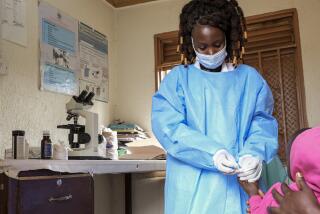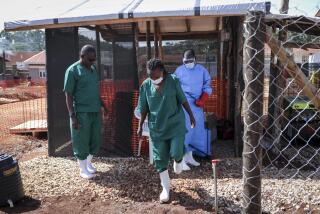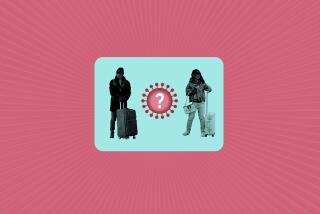Playing It Safe in Africa
- Share via
After all the news about the deadly Ebola virus outbreak in Zaire, travelers planning trips to Africa in the near future may be wondering if they are in any danger.
The U.S. State Department does recommend that anyone going to or near the affected area of Kikwit, Zaire, “postpone” their trip. But other government officials stress that travelers have little cause for concern about contracting the disease in parts of Africa that are outside the infected area of Zaire, which is little visited by leisure travelers. Popular destinations for safari tours, such as Kenya and Tanzania, have not been affected.
“It’s very unlikely passengers on international flights are going to encounter anyone with Ebola fever,” said Dan Epstein, a spokesman for the Pan American Health Organization, the World Health Organization’s branch for the Americas. Quarantines have been imposed on the city of Kikwit--center of the outbreak--in an effort to contain the disease.
“The risk to travelers is low,” said Dr. Robert W. Pinner, an epidemiologist for the federal Centers for Disease Control and Prevention National Center for Infectious Diseases.
Although it is the Ebola virus that is getting the attention, this is a good time to remind travelers to Africa that there are other deadly or serious diseases present on the continent--AIDS and malaria are two prevalent ones--that they should take precautions against.
Some safeguards against the HIV virus, which causes AIDS, are the same as for avoiding the Ebola virus. Since Ebola and HIV can be transmitted through the blood by unsterile needles, travelers should consider packing sterile syringes (a doctor’s prescription is needed to obtain them) for use in an emergency. Avoid medical care in hospitals in affected areas, and avoid blood transfusions in general. Some travelers may want to consider buying medical evacuation insurance so that a quick departure in an emergency is financially plausible. Obviously, sexual activity with residents in areas affected by Ebola and HIV could be dangerous.
The Ebola virus is transmitted primarily by contaminated needles and close contact with seriously ill patients, according to the CDC. Transmission usually occurs by direct contact with vomit, semen, blood or organs. It is commonly believed that people with Ebola become infectious only when they are extremely ill and are hemorrhaging, according to the World Health Organization. But medical experts differ on routes of transmission, with some suggesting that respiratory or gastrointestinal routes are possible.
“Travelers to Zaire are at low risk of acquiring the disease under normal circumstances,” according to the CDC. But to eliminate the risks, the CDC advises avoiding Kikwit, which is about 250 miles east of the capital city Kinshasa, and surrounding areas within Bandundu province. There have been reports but no confirmed cases of Ebola in Kinshasa, a CDC source said at press time Wednesday. Travelers have not been told to avoid Kinshasa, but are advised to contact the U.S. Embassy upon arrival there.
As a precautionary measure, the CDC has requested all airlines serving the United States from any foreign country to distribute health alert notices to travelers arriving in the United States. Travelers are asked to keep the cards in their wallet or purse for six weeks. The notices read: “If you become ill during this time, give this card to your physician and tell him/her about your recent travel outside the United States. You could have been exposed to a communicable disease before arriving in the United States, and knowing about this may be helpful to your physician in making a diagnosis.”
For updated information, travelers can call the CDC’s International Travelers’ Voice Information Service at (404) 332-4559. (Press 1, then 4, to listen for the outbreak menu for Zaire.) Another option is to fax the CDC Fax Information Service, (404) 332-4565, and request document No. 221009.
The Healthy Traveler appears the second and fourth week of every month.
More to Read
Sign up for The Wild
We’ll help you find the best places to hike, bike and run, as well as the perfect silent spots for meditation and yoga.
You may occasionally receive promotional content from the Los Angeles Times.






